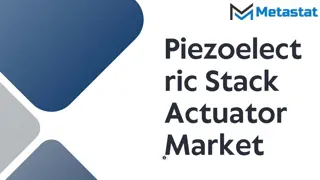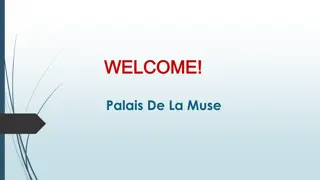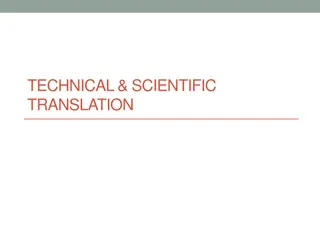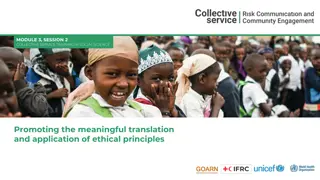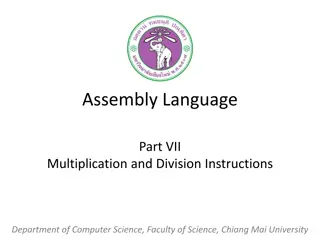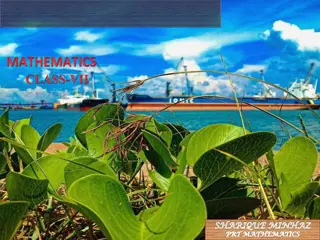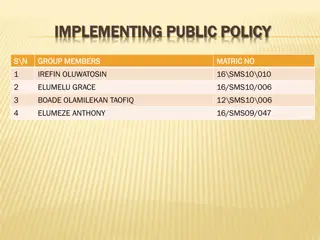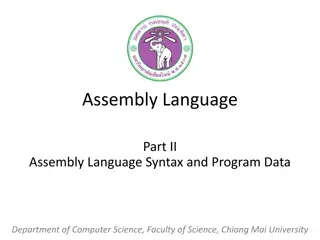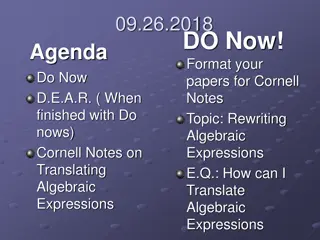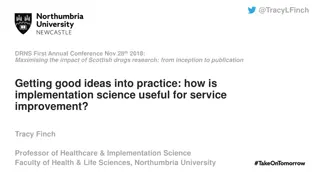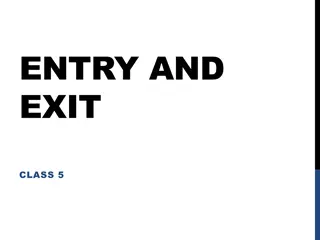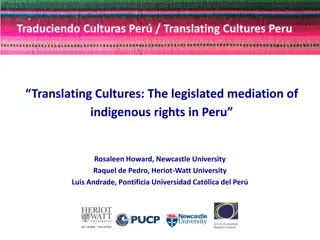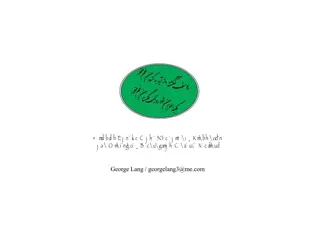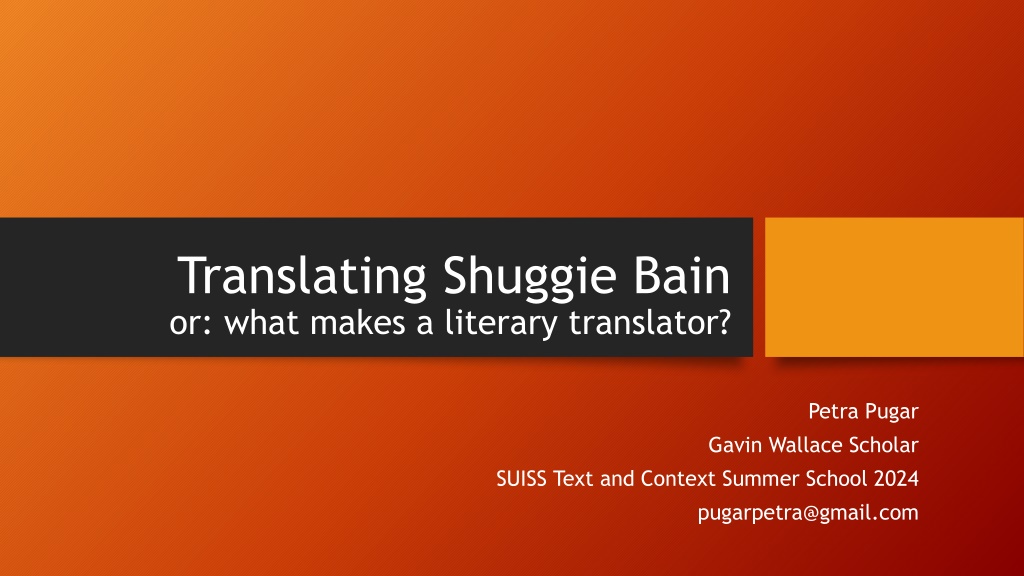
Decoding Literary Translators: Insights from Shuggie Bain
Explore the world of literary translation through the lens of Shuggie Bain, delving into the role, challenges, and impact of translators in the publishing industry. Uncover the process behind bringing foreign books to new audiences and discover the collaborative efforts that shape the translated literary landscape.
Download Presentation

Please find below an Image/Link to download the presentation.
The content on the website is provided AS IS for your information and personal use only. It may not be sold, licensed, or shared on other websites without obtaining consent from the author. Download presentation by click this link. If you encounter any issues during the download, it is possible that the publisher has removed the file from their server.
E N D
Presentation Transcript
Translating Shuggie Bain or: what makes a literary translator? Petra Pugar Gavin Wallace Scholar SUISS Text and Context Summer School 2024 pugarpetra@gmail.com
Translation as lifelong learning Academic background PhD (pending) in Scottish Literature Visits to Scotland - including SUISS! Previously translated work: novels, TV Linguistic background: dialect Research!
Some translation statistics up to 90% of all published books in Croatia are translations! 3% of all literature in English is translated from other languages smaller languages largely depend on translators hegemonic language in the book market And yet, literary translators are mostly freelance workers, not employed by the publisher. Precarious existence, often unionised.
Translators role in the publishing chain a.k.a. how a foreign book gets published STEP 1: Interest, foreign rights acquisition (Editor-in-Chief) STEP 2: Choosing the translator and editor, agreeing on the terms STEP 3: The translator writes the first version of the translation (V1) STEP 4: A language expert copy-edits the text, the translator accepts it (V2) STEP 5: Editing phase: the translator + the editor (V3) STEP 6: Graphic designer makes a typeset PDF (V4) STEP 7: Final corrections, preferably a pair of fresh eyes (V5) STEP 8: To the printing press! STEP 9: Marketing, talks, social media
Douglas Stuart, Shuggie Bain 2020 Man Booker Award Sparked attention in the publishing world 20 simultaneous translations: Greek, Dutch, Italian, Swedish, Danish, Polish, French, German, Croatian, Georgian, Portuguese, Bulgarian, Turkish, Ukrainian, Slovak, Slovene, Vietnamese, Hebrew, Chinese, Korean opportunity for collaboration?
The Shuggie Bain Translation Group Unusual in the publishing world usually you contact the author only in the case of extreme emergency! Questions to the author Collaborative answers
Examples linguistic specificities Ah m jist away to cash ma dole, might stop in at the Brewers Arms, then put a wee line on.
Examples intercultural differences - The Vietnamese translator needed to know the age relations of the women living in the scheme - Vietnamese has a large number of pronouns that depend on that information Colleen -> Agnes -> Jinty -> Noreen -> Bridie?
Examples social system The two men who were not being paid for by the social services had to slip the first of their wages under her door Q: We're not familiar with the system. Does this mean that if you were on benefits, the social services paid your landlady/lord directly? A: Yes, but only if you were on long-term benefits or disability - not short-term unemployment. We can assume these men were long term because they are generally elderly. You would receive a rent allowance directly from the government for the exact amount of your rent, and it was paid directly to the landlord, although sometimes the tenant received the money and needed to pass it on. Either way, it was not "wages" in the traditional sense.
Examples social system Agnes cashed the Monday Book with the air of a queen. She walked directly past the milk to the front of the shop and promptly bought twelve cans of Special Brew. - government issued coupon books - Agnes has a Monday Book "disability allowance" for about 36 pounds, and a separate Tuesday Book "Child allowance" - The book was like a thick rations book and the teller would check the allocated amount and then stamp the book and tear out the coupon for that week and give the beneficiary their money.
Examples social system Four-in-a-block housing scheme, mining town
Examples Scottish culture Q: what is a fair week caravan? A: Being a heavily unionized, industrial city, the workers of the city celebrate a Fair-Fortnight (two weeks), or a Fair Week every summer. It is essentially a two week period where all heavy industry in the city closes, and the workers have their vacations at the exact same time. Caravans were a working class luxury. Glaswegians would rent a caravan (the very lucky amongst them might own their own) and would move en mass to the coast for the fair-fortnight holiday. The caravans were always stationary, like coastal mobile homes, and you rented them by the week.
Examples circumstances necessitating new terms there is flitting and then there is moving house "Moving House" is seen as quite a grand thing, a middle-class thing and Agnes aspires to this. There are hired movers: a van and men who will carefully pack and transport everything for you without you having to do very much. The family can show up whenever they like. It is expensive to move house this way. "Flitting" is a Glasgow term for what working class families do. It means they do it themselves, with all their belongings crammed into a car or van. It's sweaty, messy, not a great way to impress the neighbours. Agnes had hoped to sweep in to this new town in quite a glamourous way. Flitting stems from the term "A Midnight Flit" which is when Glaswegians move house in the middle of the night in order to not pay their landlord any rent owed. They don t own much, so they simply run away, they dissapear.
Examples sensitive language Leek s mocking: Gerald Fitzpatrick and Patrick Fits Gerald Creativity required, but also sensitivity Ethical responsibility when translating narratives related to the identity of marginalized groups
Conclusion what makes a literary translator? The translator as the most active reader Cultural and linguistic transfer. Constantly deciding what gets included and what is left out there are no neutral translations! No two translators will make the same translation, every new translation is a new human-made creation expanding the worldwide corpus of original texts -> are future AI literary translators likely? Not always a solitary job A conversation with the author and the reader
THANK YOU Petra Pugar pugarpetra@gmail.com




